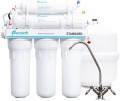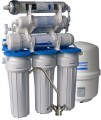Stages of purification
The number of purification stages provided for in the filter design. At each stage, water passes through its own filter element, clearing itself of certain contaminants; in this case, the steps are arranged in order from coarser cleaning to finer. For example,
a three-stage system may look like this: the first stage is mechanical removal of impurities, the second stage is the removal of ferrous, and the third is filtration through a carbon cartridge.
The more stages of purification — the more advanced the filter is considered, the cleaner water it usually provides at the outlet. Accordingly, this moment largely depends on the purpose (see “Type”): for example, multi-stage filtration is quite rare in main models, it is practically not used at all in pre-filters, but the number of stages can reach 9 in models for sink.
Pollution clipping
The smallest size of foreign particles (in microns) that the filter can hold in total. Accordingly, the smaller this size, the higher the filtration efficiency, the less undissolved impurities remain in the filtered water. On the other hand, finer cleaning usually takes more time, which affects the speed (throughput) of the filter. It should be noted that in the case of using reverse osmosis filters, the filtration is very fine, up to 0.01 microns.
Filtration speed
The amount of water that the filter is able to pass through itself per unit of time (of course, effectively purified in the process); usually stated in liters per minute. This parameter is largely related to the type (see above): for example, in jugs, the filtration rate usually does not exceed 0.5 L per minute, while for main devices that supply entire apartments, a throughput of tens or even hundreds of liters is required.
Note that it does not always make sense to pursue a high filtration rate. After all, other things being equal, finer cleaning takes more time; accordingly, the faster the filter works, the higher the chance that the quality of such cleaning will be relatively low. And devices that purify water efficiently and quickly usually have an appropriate price. Therefore, it is worth considering the purpose of the filter and, on the basis of this, determine the balance between the filtration speed and its quality when choosing. It is also worth keeping in mind the conditions of use: for example, if you need to filter low-quality tap water for drinking, it is better to sacrifice speed in favor of efficiency.
Min. operating pressure
The lowest inlet water pressure at which the filter is able to fully perform its functions. Indicated for models with a connection to the water supply — directly or through a tap (see "Connection").
The design of some filters requires a certain level of inlet pressure for normal operation; if the pressure is insufficient, both throughput and overall filter efficiency suffer, and some functions are not available at all. The latter is especially true for reverse osmosis (see above). Therefore, if the minimum operating pressure is directly indicated in the filter characteristics, you should make sure that your water supply system complies with this parameter before purchasing.
Note that for filters with a booster pump, this column indicates the lowest pressure at which the filter still does not require the use of a pump; see "Pump" for details.
Max operating temperature
The highest inlet water temperature at which the filter is able to operate normally. Modern filters are conditionally divided into models for cold and hot water: the operating temperature in the first case does not exceed 40 °C, and in the second it can reach 95 °C. For more information on the importance of matching water temperature and filter characteristics, see "Purpose".
Replacement cartridges
Models of replaceable cartridges for which the filter is designed. Knowing the names of models, it will be much easier for you to find a replacement for an exhausted cartridge. In addition, the options directly named by the manufacturer are fully compatible with the filter and correspond to official specifications, while there is no such guarantee for "non-native" cartridges.
Several names in this paragraph are usually indicated for filters with multi-stage filtration (see "Stages of purification") — a cartridge for each stage.
Tank volume
The capacity of the reverse osmosis tank. The higher the value, the more water can be filtered for future use. Popular sizes include
a 12 L tank and
a 15 L tank. Only in this case the dimensions for installing the filter will become larger. Accordingly, more is not always better. And yes, it affects the price.

